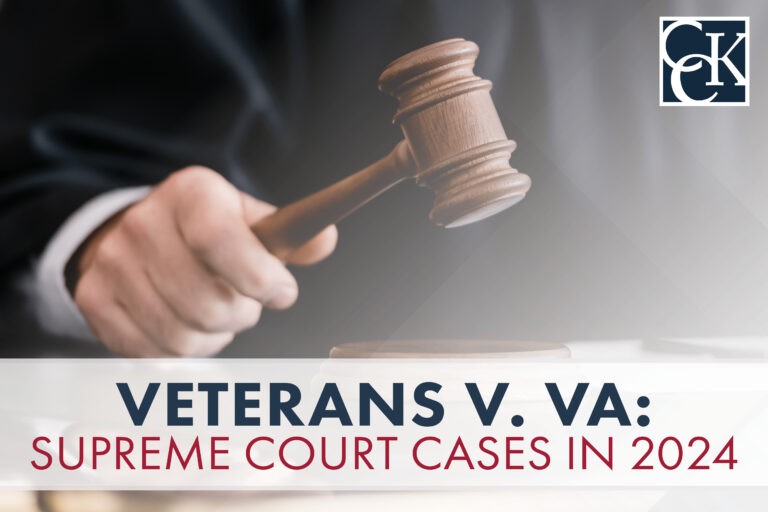Veterans v. VA: Supreme Court Cases in 2024

CCK Law: Our Vital Role in Veterans Law
It is rare for a Supreme Court of the United States (SCOTUS) term to feature even one veterans law case. But this year, SCOTUS decided one case and granted certiorari for (i.e., agreed to review) a second. Both cases could affect the lives of thousands of veterans. We are going to briefly examine each of them.
Rudisill v. McDonough: A Boost for Education Benefits
In Rudisill v. McDonough, the Supreme Court ruled that veterans who separately accrue benefits under both the Montgomery GI Bill and Post-9/11 GI Bill are entitled to use both benefits, in any order, up to the 48-month aggregate cap. This overturned the decision by a lower court that switching programs would result in the lower cap of 36 months.
For veterans who are eligible for both GI Bills, this may potentially make them eligible for another year of education benefits. VA may be working on new guidance that formalizes the rules around this.

An Unnerving Concurrence about “Veterans Canon”
Something else notable about this case was Justice Kavanaugh’s concurrence, which questioned the “veterans canon.” According to the veterans canon, courts are supposed to resolve in a veteran’s favor any question about what a law means. Justice Kavanaugh questioned whether this rule is even valid, and three other justices shared his concerns.
While the veterans canon was not a deciding factor in the case, and Justice Kavanaugh’s opinion does not change the law or policy, if his opinion did get traction in the future, it would upend decades of veteran-friendly precedent. Though the courts don’t use the veterans canon very often, it is concerning that there is any doubt—especially from four Supreme Court justices—as to whether the veterans’ benefits system is supposed to treat veterans more favorably than other benefits systems treat claimants.
Bufkin v. McDonough: Benefit of the Doubt
What does the U.S. Court of Appeals for Veterans Claims have to do to make sure veterans received the “benefit of the doubt”? SCOTUS has agreed to hear arguments about this question, and the results could have a significant impact on future claims appeals.
VA is supposed to give veterans the benefit of the doubt on all questions in their claims, including what happened in service. If a veteran believes that VA failed to do this, the veteran can appeal the VA’s decision to the U.S. Court of Appeals for Veterans Claims. However, the Veterans Court historically has required veterans to show “clear error” in VA’s application of the benefit of the doubt rule, which is a high burden and difficult to prove.
SCOTUS has agreed to hear arguments about whether the Veterans Court should examine much more carefully whether VA properly applied the benefit of the doubt rule. Depending on what SCOTUS decides, this could make it significantly easier for a veteran to prove that VA did not apply the benefit the doubt rule when deciding a claim.
About the Author
Share this Post
